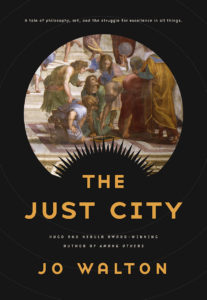Synopsis: The goddess Athena yanks the 400 most rabid Plato-fans from human history and gets them to try to create the utopian city he described in “The Republic.”
Book Review: This is the longest, most boring example of Pretending to be Wise I’ve seen so far. As an example of “humans are bad at creating utopias” it’s revoltingly shoddy. First of all, anyone alive could have skimmed The Republic and told you “Oh yeah, this is ludicrous, there’s no way it would work.” If that’s Walton’s thesis, it’s about 2,500 years too late. Maybe the ancient Greeks would’ve found this interesting, but I suspect even they knew it, and Plato had some other point to make rather than “Hey, this is a great blueprint for society.”
I like message fiction. I’m a fan of Ayn Rand’s works, and John C. Wright’s works, even though I find their ideologies atrocious. That’s because they know how to write good message fiction. They stir up one’s sense of injustice at a crazy, broken world, and offer extravagant, soaring solutions. Walton doesn’t do that. She briefly mentions the sexism of pre-modern societies, and then drops us into a toy-city that runs on god-granted post-scarcity and a shocking lack of realistic humans. And all they do is bloviate about Plato and what “excellence” meant to him, without actually saying anything.
For example, in a discussion of whether it is permissible to allow children to look at replicas of art rather than the originals (yes, really) a character claims that even a perfect replica wouldn’t work… even though a child couldn’t tell the difference, “their souls could.” And it’s left at that. Now, this is something that could have led to an interesting exploration on the matter by Walton. As a modern human, she is aware of recorded music, and the richness it brings to our lives. Perhaps she could argue about the overwhelming value of live music over recorded if she wants to give Plato some help. But she never did. Just the ridiculous claim that something touched by the hands of the artist is intrinsically better without even the hint of a figleaf of explanation as to why. Furthermore, as an author, she works in a medium were the audience never sees the original document! In the vast majority of cases, an “original document” is just a Word file anyway. Her art medium is the one where this replica-vs-original argument is most salient. And yet, nothing is explored. Plato’s words are spoken, the author refuses to say anything of interest or cast any judgement, and we continue on without ever revisiting the issue.
An intense red flag popped up when Christianity is discussed, and one says: “Christianity is harmful…because it offers a different and incorrect truth,” as opposed to “the real Truth that a philosopher can glimpse.” Holy shit, those are the words of someone who has no idea what the word “truth” even means, and who seems to be regurgitating mystical BS rather than actually investigating the idea. You can’t offer a “different truth,” dammit, only falsehoods! “Differing truth” is the woo that those who want to spread lies hide behind. This would be OK if it was just a character mouthing crazy, and this issue was then explored. But, again, the wise course that’s displayed is simply to present the statement and not make any claims as to its value or validity.
Almost all the book is like this. It’s insufferable. Also this sort of thing is most of the action, and it’s boring. Nothing else really happens, and the couple times it does, the events don’t change anything!
The humans are one-dimensional cargo-cultists, which I guess they’d have to be to think this Republic experiment has any worth to it, but it makes them stupid and bleh to read. The one bright spot of the book is Apollo, who incarnates in human form to explore what it’s like to be mortal. He actually is a fun character, and discovers some touching things about what it means to be human. But sadly, his chapters are very few and far between.
Oh, also, the worst handling of AI awakening I’ve seen since WWW:Wake. The Just City’s philosophy might be two millennia out of date, but the understanding of AI is at least five decades behind, and I’m not sure which is more disappointing.
Not Recommended.
Book Club Review: Unfortunately, a convergence of disparate events resulted in a low turn-out for this meeting, so it’s harder for me to judge. The vast tornadoes of faux-philosophical hot air that our characters subject us to would suggest that there’s quite a bit here to spark discussion. But none of it is terribly interesting discussion. As mentioned, perhaps the ancient Greeks would have found something intriguing here. But the state of thought has moved on from then. The discussion nowadays would just be rife with frustration, like when you’re trying to talk with a fundy Christian about what advances in CRISPR mean for the future of humanity, and they’re hung up about whether this will piss off god or not and can this alter one’s soul? This is not the sort of conversation it’s worth having with anyone. So I’m going to go with Not Recommended.


Could you say more about what you found disappointing in WWW:Wake, if you wrote a review I can’t seem to find it and I remember liking that series. Is it just the standard AI is too human complaint?
Yeah, it was before I started this blog. Yup, the AI is ridiculously human. Not just any human either, it feels a lot like a middle-aged Canadian male. Once I noticed that, I noticed that the teenage Chinese girl feels very much like a middle-aged Canadian male too. In fact, everyone did. But really, the AI was what irritated me most.